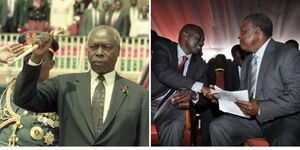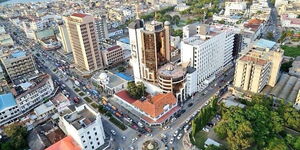President Uhuru Kenyatta on Sunday evening gave reasons why the government was not able to pay teachers the increased salaries justifying that there would be serious repercussions after such a move.
While addressing the nation on live television broadcast, President Kenyatta said if the government awarded teachers the improved salaries then the country's wage bill would rise from 51 to 61 per cent of the total revenue.
On the alternative of raising money to pay teachers, Uhuru said that the government would have to increase the value added tax (VAT) from 16 to 22 per cent, a move that would burden Kenyans because prices of goods shall go up.
In his statement, the President also ruled out the option of borrowing funds or sacrificing other critical development projects in health and education to effect teachers' pay rise, terming them untenable.
Kenyatta gave a comparison of Kenyan teachers' salaries with those of their counterparts in other African countries saying that Kenya was paying the third highest salaries after Morocco and South Africa.
The Head of State further clarified that his government did not owe teachers any arrears from the 1997 pay agreement, saying that the 150-200 per cent increase had been fully settled.
Uhuru noted that the lowest earning teacher in Kenya walked away with Sh23, 692 which he said was seven times better than that of a teacher of the same grade in Burundi, adding that the figure was also higher compared to that of Ugandan and Tanzanian teachers.
In the broadcast Kenyatta pleaded with teachers to reconsider their position on the matter saying it was wrong holding children hostage to pay demands.
“I urge all teachers as parents, as public servants and as Kenyans to reconsider the matter and resume their duties,” he said.
However, speaking on NTV immediately after the President's address, Secretary General of Kenya National Union of Teachers, Wilson Sossion, faulted the figure cited by the president saying that whoever wrote his statement misled him.
Sossion said that a P1 teacher in Kenya only earned a basic salary of Sh16,690 and not Sh23, 692 as the President mentioned in his statement.
The teachers' industrial action enters the fourth week, as schools remain closed following governments directive that ordered the closure of both public and private schools.
The directive was however protested by private schools who said through their association, that they would not heed to the call since they had nothing to do with the strike and that they had a contract with their teachers and parents in which they were to comply.
Read Also: Private Schools React to Gov't Order to Close All Schools












